8 Quick Language Games popular with Schools
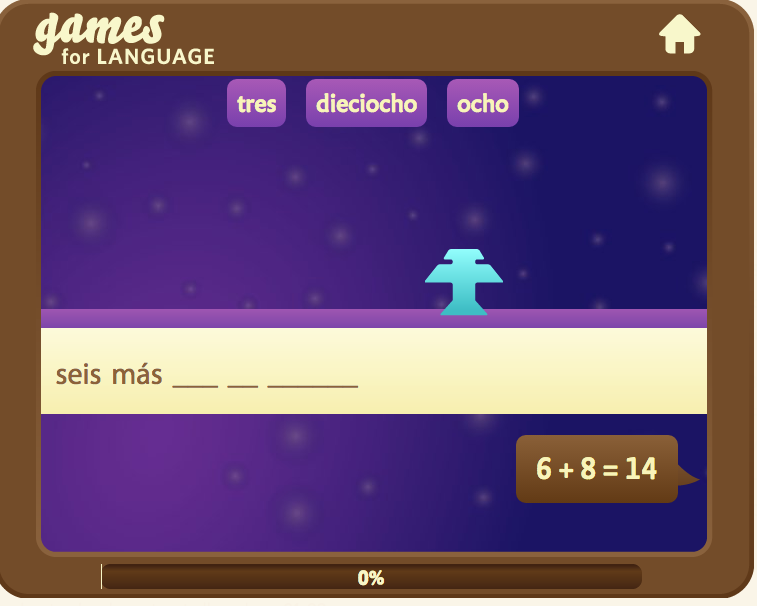 Our Quick Language Games have become popular with schools. Why? Our games are for beginning and elementary learners (Levels A1 and A2).
Our Quick Language Games have become popular with schools. Why? Our games are for beginning and elementary learners (Levels A1 and A2).
Each game takes about 3 to 5 minutes to play, teaches easy vocabulary, and, like the Spanish language game in the image, includes fun exercises such as Word Invaders.
Also, our site is completely free, doesn't bother you with ads, and you can play without registering.
Sometimes we're surprised which games are played the most.
But before we dive into the Quick Language Games that have been most popular recently, you might wonder:
WHY GAMESFORLANGUAGE?
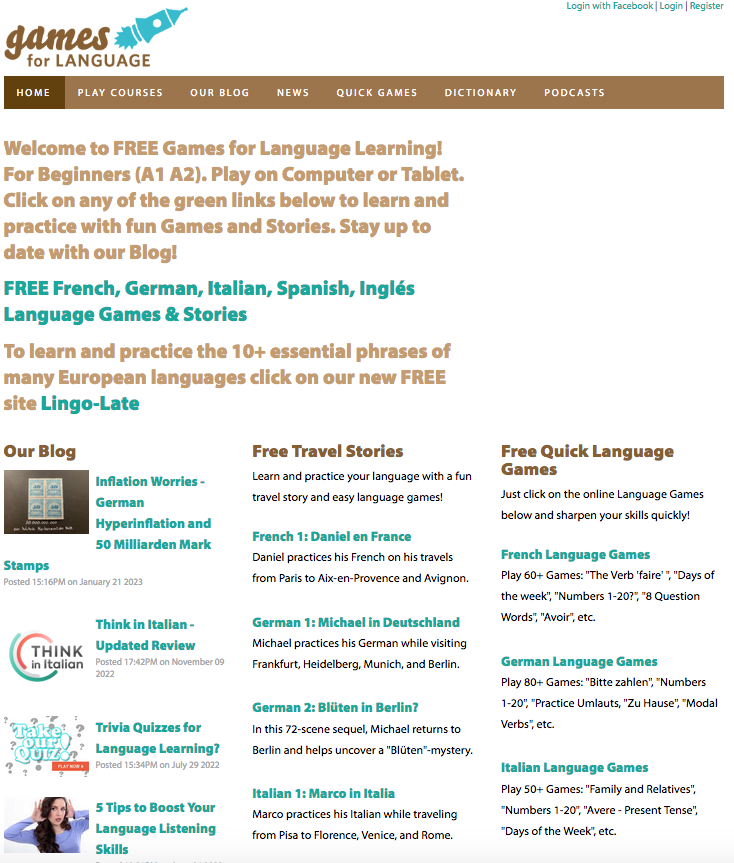 Why are we doing this? As lifelong language learners, we started GamesforLanguage - Language Games, Travel Story Courses, Blog - as a way of staying in touch with the languages we speak, and of course to learn new ones.
Why are we doing this? As lifelong language learners, we started GamesforLanguage - Language Games, Travel Story Courses, Blog - as a way of staying in touch with the languages we speak, and of course to learn new ones.
Peter had learned French and English by living abroad after finishing high school. He was now eager to add Italian and Spanish. Currently he is working on his Dutch.
I had grown up in Austria, the Netherlands, and Canada. My work background was language teaching to college students. I taught German to English speakers, and English to German speakers.
During my teaching career, I was trained to use various methods, which included the traditional Grammar-Translation method (learning rules and vocabulary to translate); the Audio-Lingual method (pattern drills, with focus on speaking and listening); and the Direct method (using only the target language for conversations, reading aloud, and writing). I also worked freelance for Pimsleur International as author and editor.
For my own language learning, I've always liked audio and direct immersion the most. I was thrilled when audio courses became easily available, first on CDs, then directly on the Internet.
For both of us, GamesforLanguage became a perfect interactive-learning project. It's been a great way to try things out and we've enjoyed becoming part of an international language learning/teaching community.
We've been lucky to find great collaborators: native speakers to write our courses and record the audio. All of the Quick Language Games we add ourselves, using the vocabulary and audio recordings of our courses. The increasing interest in our Quick Games motivates us to keep adding more of them.
TOP GAMES IN RECENT MONTHS
Note: Most of our games are a sequence of "Memory" "Word Shoot" "Flash Cards" and "Word Invaders".
Quick French Games
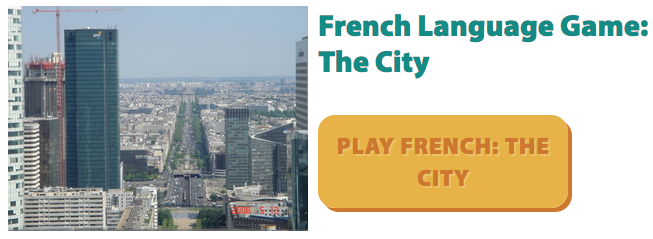 The City
The City
Level A1. Learn and practice 8 city-related nouns and put together 6 easy phrases that require agreement or the correct preposition. For example: "sur le pont d'Avignon" (on the Avignon bridge); "la vieille ville" (the old town).
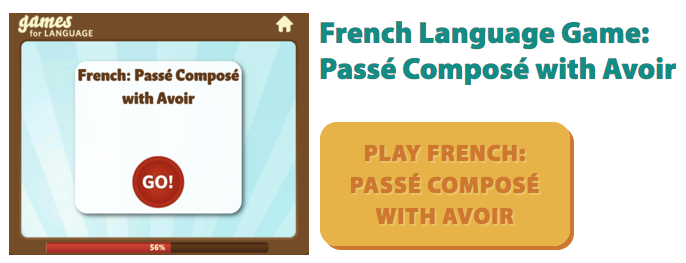 Passé Composé with "avoir"
Passé Composé with "avoir"
Level A2. Learn and practice the forms of the Passé Composé with the auxiliary, or helping verb, "avoir". [The Passé Composé is used for an action or event that was completed in the past.] You're then challenged to put together a few simple sentences using basic vocabulary. For example: "Ils ont fait une promenade" (They took a walk); "Nous avons acheté une maison" (We bought a house).
You'll find more about French Quick Games in 5 Easy French Language Games or find all of them on our French Quick Games Page.
Quick Spanish Games
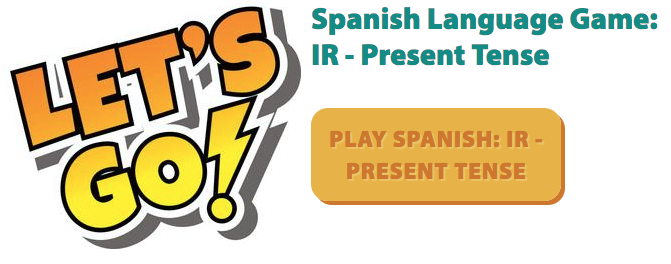 "Ir" Present Tense
"Ir" Present Tense
Level A1. Learn and practice the individual present tense verb forms of the irregular Spanish verb "ir" (to go). Then put them into the context of short and easy sentences, such as "¿Ustedes van al concierto mañana?" (Are you going to the concert tomorrow?); "Ellos van a la estación" (They're going to the station).
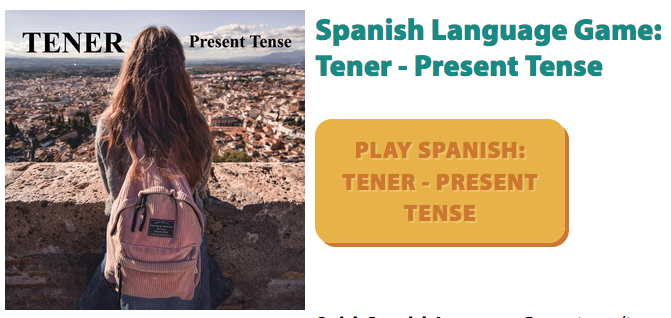 "Tener", Present Tense
"Tener", Present Tense
Level A2. Practice the present tense verb forms of the irregular Spanish verb for "to have". Then, using basic vocabulary - such as "el libro", el tiempo", "la pregunta", los "euros" - you'll put together easy sentences. For example: "Él tiene todos mis libros" (He has all my books); "Tenemos mucho tiempo" (We have a lot of time).
More about Spanish Quick games in 7 Easy Spanish Languages Games or all of them on our Spanish Quick Games Page.
Quick German Games
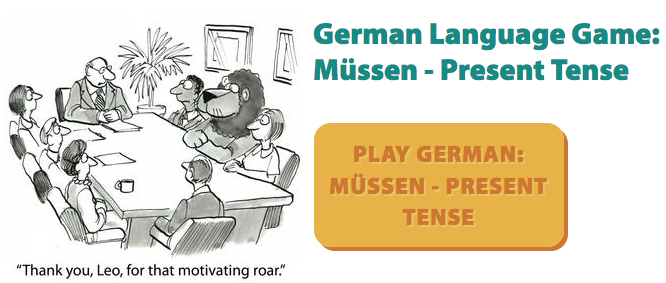 "Müssen", Present Tense
"Müssen", Present Tense
Level A1. Practice the present tense forms of the modal, or helping verb, "müssen" (must, to have to). Then put together simple sentences, which will help you figure out German word order. In German, a modal verb goes in second position in a statement, and in first position in a question. Examples: "Sie müssen warten" (They have to wait); "Muss ich umsteigen?" (Do I have to transfer/change trains?). If there's a "dependent infinitive", it then goes to the end: "Sie muss das Buch finden". (English: She must find the book").
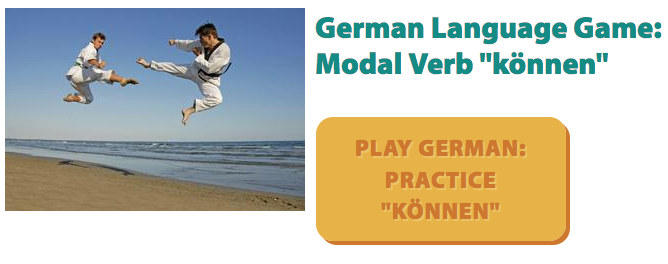 Modal Verb "können"
Modal Verb "können"
Level A2. With he modal verb "können" (can/to be able), you can express an ability or a possibility. Learn and practice the present, past, and conditional forms of "können" (can/to be able) and form simple sentences. They'll also help you practice German word order: "Ich könnte dich morgen treffen" (I could meet you tomorrow); "Ich konnte dich gestern nicht anrufen" (I couldn't call you yesterday).
More about German Language Games you'll find on 6 Easy German Language Games for Fun Learning or all of them on our German Quick Games Page.
Quick Italian Games
 8 Question Words
8 Question Words
Level A1. Question words are basic tools for communicating, and picking the right one helps you to get your message across. You'll practice distinguishing between the Italian for where?, when?, how much?, which?, who?, how?, why?, and three forms for what? Finally, you'll hear and then put together simple sentences, such as: "Come è andato il viaggio?" (How did the trip to?); "Quando parte il prossimo treno?" (When does the next train leave?)
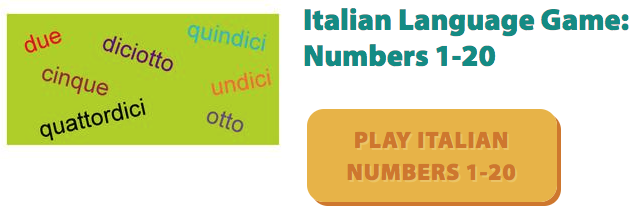 Numbers 1 to 20.
Numbers 1 to 20.
Level A1. With this interactive Italian numbers game you can learn the numbers 1-20 in Italian. Part of the practice are a few simple additions, such as: "Uno più quattro fa ... " (1+4= ...); "Sette più otto fa ..." (7+8 = ...).
Another post may interest you: 5 Easy Italian Language Games, and you'll find all of our Italian Games on our Italian Quick Language Games page.
LEARNING WITH OUR GAMES
FOCUS: We learn best when we really focus all of our attention on what we're doing. The games are short, only 2 to 5 minutes. The audio you'll hear is in the target language only. And so, paying full attention is not difficult.
LIMITED VOCABULARY: As a beginner, it's hard to keep too many new vocabulary items in your memory at the same time. If you just focus on a few, they'll stick better.
PRONUNCIATION: By repeating words and phrases right after the native speaker, you practice producing sounds that may not exist in your native language. It takes focused practice to get those right.
LISTENING: The skill of "listening comprehension" in a new language may be the hardest to learn, especially if native speakers rattle on as they normally do. The best way to build listening comprehension is from the ground up: become familiar with the sounds of frequently-used words so that you can start picking them out of easy conversations.
GRAMMAR: Our brains intuitively look for patterns, and that's what grammar is. Learning abstract rules can be a chore. A better way is to make sound combinations and grammar patterns intuitive, something that a language game can help you with.
FLUENCY? No program alone can make you fluent. For that you need direct and frequent interaction with other speakers. But basic listening and speaking practice - as with language games - can help you build a good foundation.
Our games make a fun resource for beginning and elementary learners and can act as a springboard to new language adventures. A journey to language fluency takes time, persistence, and patience. And it should be fun too.
